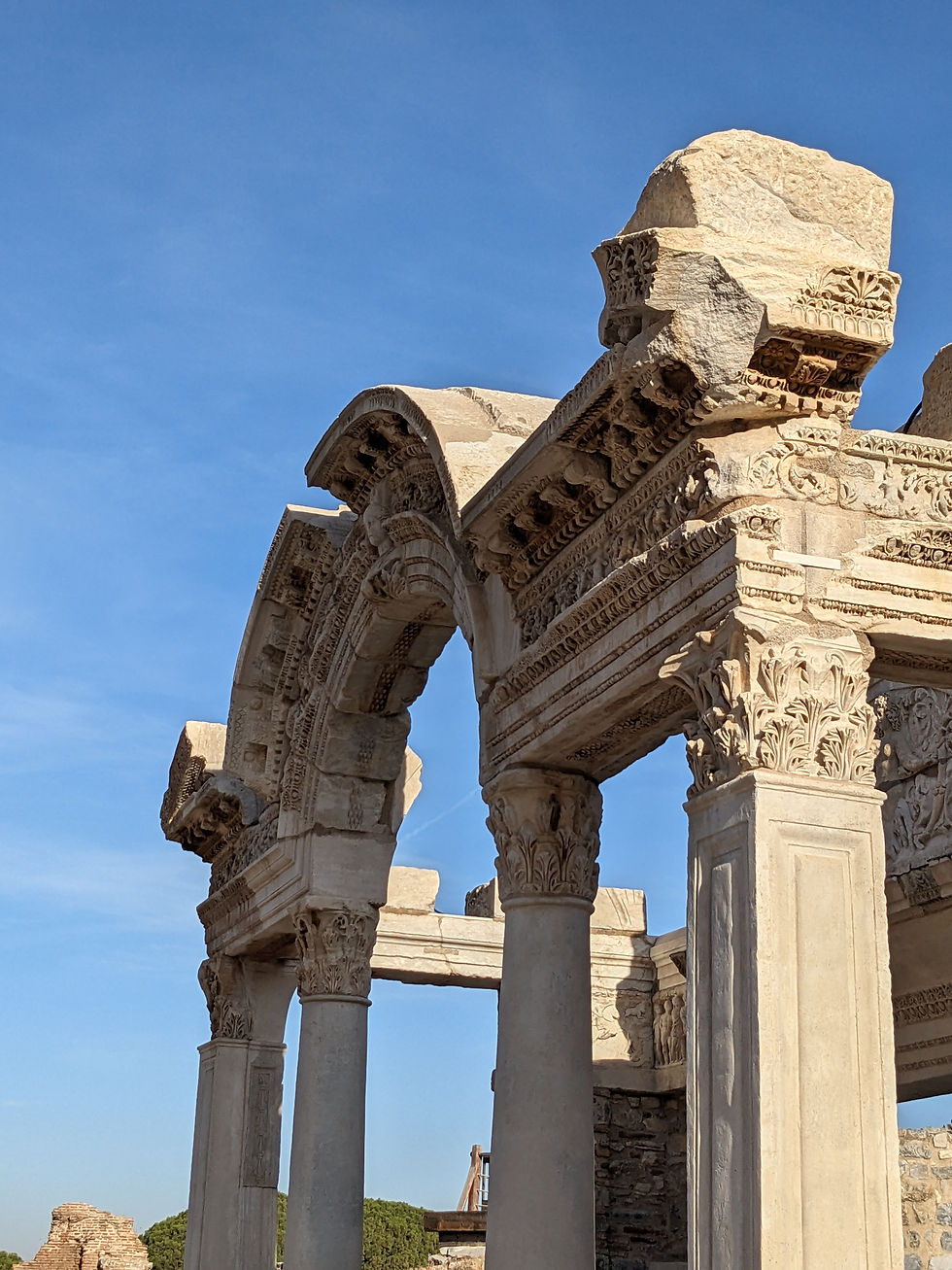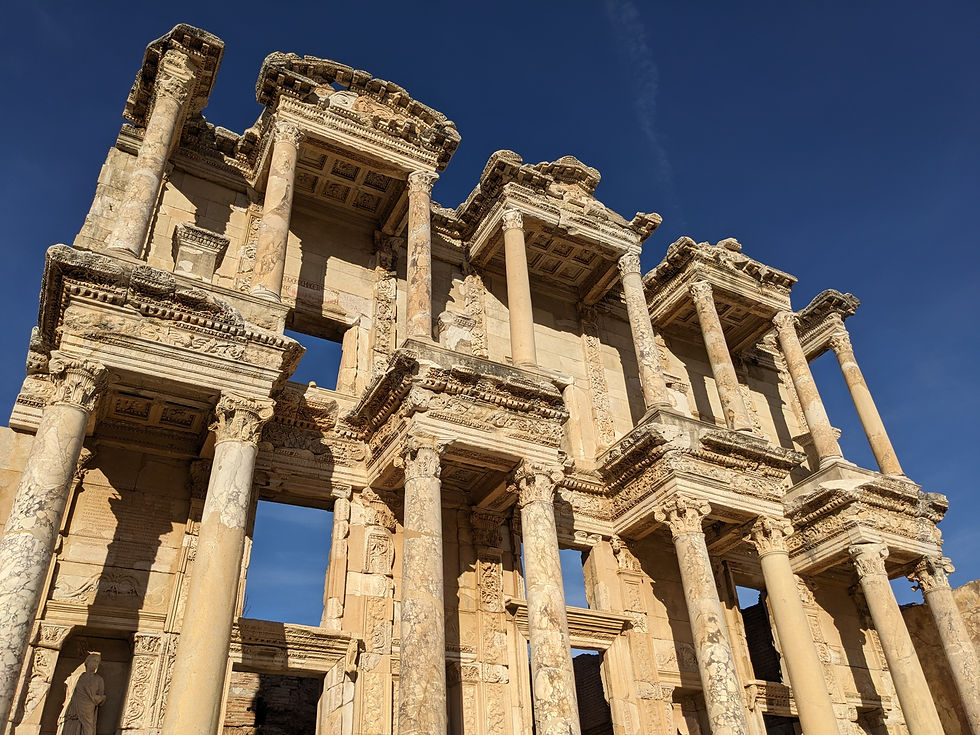The Biblical Principles I Learned While Studying Abroad in Greece and Turkey
- Cultural Compass

- Jul 30, 2025
- 5 min read
Updated: Aug 19, 2025
Contributor: Wyatt Thompson
In November 2024, I took a trip of a lifetime for an online college class at Southeastern University that changed me in ways I would never have expected. Among the incredible landmarks of Greece and Turkey, I saw the river where Lydia was baptized, the Philippian jail cell, the Cave of the Apocalypse, and the Areopagus. It was truly amazing to take this tour to see the places where Paul went and I am now able to visualize the cities when I read about them in the Bible. Throughout the tour, God showed me three big themes that I have taken home and applied to my daily life.
Theme 1 – The Humility of Christ
The day after I landed in Greece with the tour group, we drove to Philippi to see the river where Lydia was baptized and the ancient ruins of the city. While we were at the river, all the travelers gathered on the steps to hear the professor’s wife give a lecture on Philippians 2:5-11. Focusing on verses five and six, she emphasized the word “robbery” to help us broaden our perspective regarding the translation of the passage.
“Let this mind be in you which was also in Christ Jesus, who, being in the form of God, did not consider it robbery to be equal with God.” – Philippians 2:5-6; NKJV
Prior to this lecture, I understood these verses to mean that Jesus did not want to deny eternal life and withhold forgiveness simply because He is God. While this interpretation may be true, the professor’s wife challenged us to think about robbery like people who lived in the Roman Empire would.
Historically, the emperors and conquerors were known for their aggressiveness to demonstrate their power. And so, to Paul’s audience, robbery meant stealing wealth and material possessions and taking advantage of women. These actions stand in direct contrast to how Jesus treated the poor and women because He addressed and satisfied their needs to demonstrate His righteous leadership.
From a young age, I knew that Jesus was kind and loving, but I never considered His actions in light of the actions of Roman conquerors. Through this revelation, I sensed a strengthening of my faith and a deeper love for my merciful God.

Theme 2 – Idolatry Is About the Desires of the Heart
Growing up in church, I believed for many years that idolatry is the act of worshipping a mythological figure. Consequently, if I did not do that, I would not be breaking the first two commandments. However, when I studied Greek Mythology for the Challenge IV Exposition Strand, I was introduced to the idea that there was some truth in the myths through Heroes of the City of Man and various videos from Roman Roads Media. As I toured the cities, I was trying to determine which explanation was true.
On the day I toured Ancient Ephesus, God revealed to me that idolatry is much deeper than the worship of a mythological figure. The Ephesians worshipped the Greek gods to receive peace and protection. These practices were transactional – they appeased the gods in exchange for prosperity.
As the tour guide explained the significance of the ruins, he pointed us to a building that had the face of Medusa over the entrance. He said that the shopkeepers would do this to ward off misfortune.


“Idols aren’t anything, but the pagan events are intertwined with the evil powers that roam the cosmos outside the church.” – Douglas A. Campbell, Paul: An Apostle’s Journey
Although they do not worship the gods of other religions, many Christians today place things that are not God at the center of their lives. In doing so, Christians participate in idol worship, just like the Ancient Greeks. They may not sing or pray to their treasures, but they find comfort and security in them.
“For the LORD is great and greatly to be praised; / He is also to be feared above all gods. / For all the gods of the peoples are idols, / But the LORD made the heavens.” – 1 Chronicles 16:25-26; NKJV
Through this experience, God showed me that idolatry begins in my heart. What matters is whether Jesus is at the center of my life. If I am relying on my own strength or finding peace in something earthly, I probably have put something else at the center of my life. We Christians should worship the Creator alone, not what we have created with our hands or our minds.
Theme 3 – Building Relationships
Going into the trip, I believed that everything that God would reveal to me would come through the professor’s lectures. In turn, I thought that I would be fine by keeping mostly to myself for the duration of the tour. After all, I would likely never see any of my fellow travelers again after the trip.
Ironically, God put me around several people with whom I could not help but connect. As the tour progressed, I decided to be intentional about getting to know my peers and other members of the tour group. I realized how much I needed community, even though I was only with these people for ten days.
In the class textbook, Paul: An Apostle’s Journey by Douglas A. Campbell, I learned that a key element to Paul’s work as an apostle was building relationships. The author explained that Paul’s friendship with Lydia allowed him to get a job in Philippi, make connections with other tentmakers, and evangelize as a result of those relationships.
“Life in the ancient world was proverbially nasty, brutish, and short. There was no social welfare and little sympathy for outsiders. … Without an introduction, starvation and exposure were the probable outcomes for poor single traveling workers.” – Douglas A. Campbell, Paul: An Apostle’s Journey
Although I would not have had to suffer from starvation or a lack of shelter, I probably would have lacked a sense of community and camaraderie. As my peers introduced themselves to me, I was able to meet their roommates and make connections with the other travelers, which prevented me from experiencing a spiritual starvation from a lack of community.
Prior to the trip, I knew I wanted to change my minor and was praying that God would clarify which minor I should study instead. While I did not realize it until the end of the trip, I know that God surrounded me with the right people at the right time. As I focused on building relationships, God used me to be the light of Jesus and impact their lives. Some even told me that God used me to bless them in their current season and some shared how they felt like I was a brother to them.
Through these experiences, I decided that I would change my minor to Missional Leadership to gain a deeper understanding of how Christian living is about cultivating relationships.
Final Thoughts
In the ten days I toured Greece and Turkey, God showed me three major ideas. In Philippi, He showed me that Christ is so worthy of praise because He is a compassionate King, not a cruel king. In Ephesus, He showed me that idolatry occurs when I remove Him from the center of my life. Lastly, throughout the whole trip, He showed me that community is a necessary part of ministry.
I am so grateful God allowed me to take this class and revealed these truths to me because they will remain relevant for the rest of my life.
For Further Learning
Experience Old Western Culture by Roman Roads Media
Paul: An Apostle’s Journey by Douglas A. Campbell

Comments